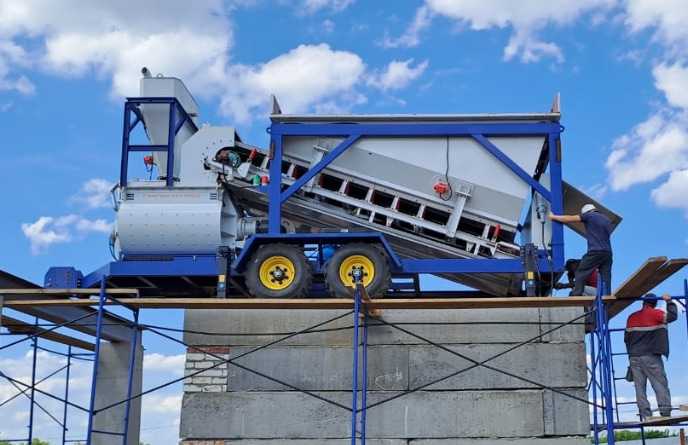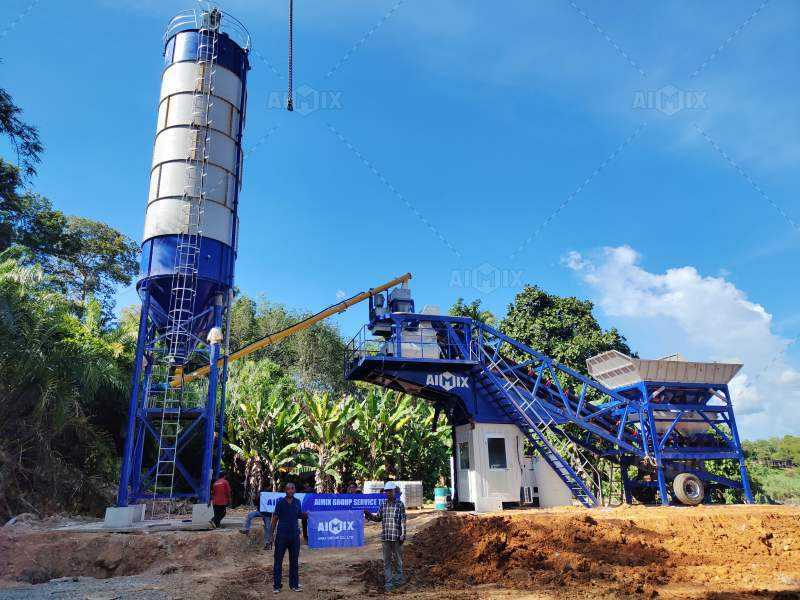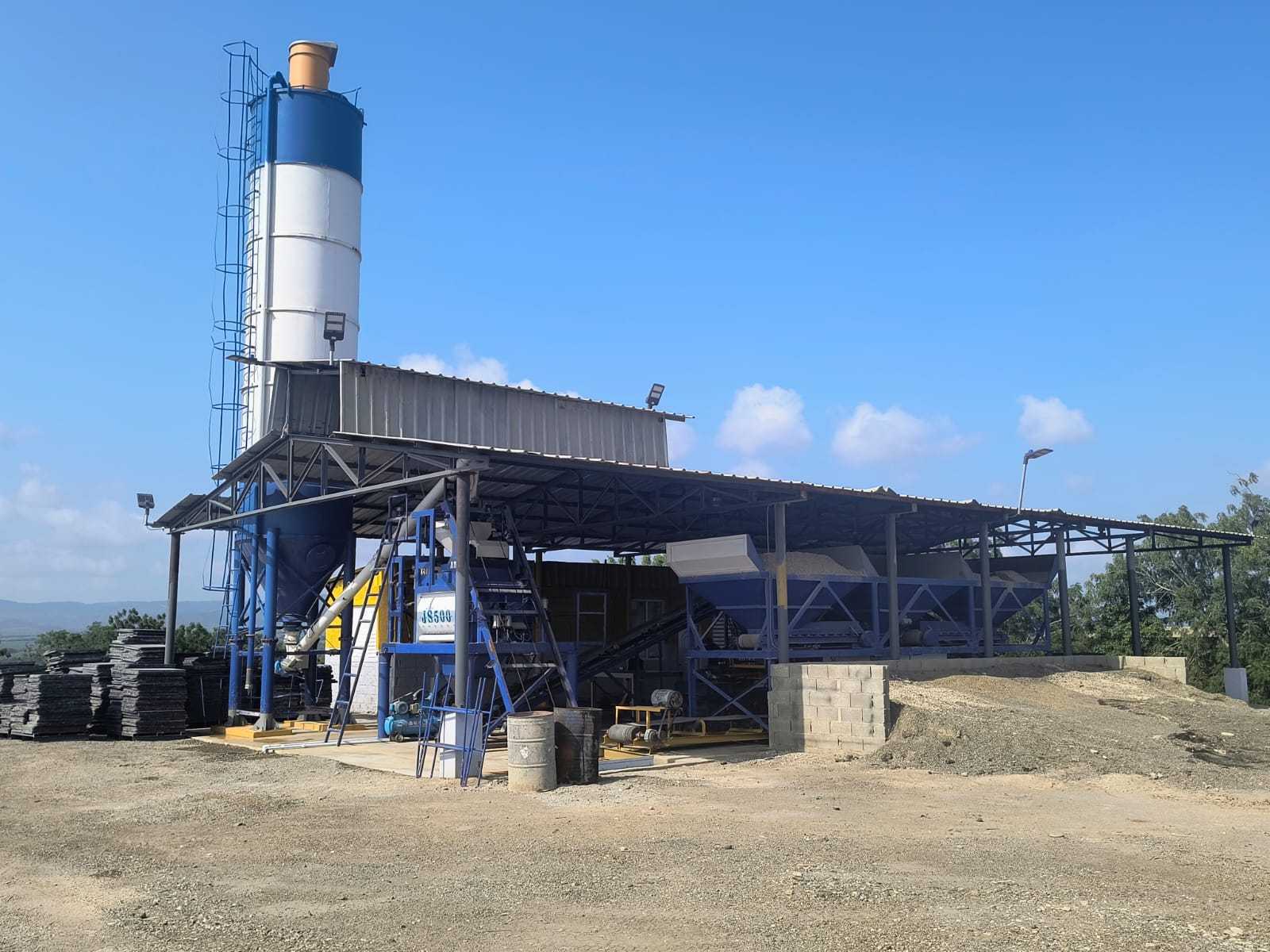Mini concrete batch plants are becoming an increasingly popular solution for small- to medium-scale construction projects due to their cost-effectiveness, flexibility, and compact design. These plants are engineered to provide high-quality concrete efficiently and consistently, even in constrained environments. One of the key features that contribute to the success of mini concrete batch plant is the advanced mixing technology they employ. By enhancing mixing accuracy, reducing waste, and improving production speed, this technology ensures optimal performance while minimizing operational costs.
In this article, we’ll delve into the advanced mixing technology used in mini concrete batch plant and explain how it improves both production quality and efficiency. We’ll also discuss how these plants utilize concrete batching plant machines to streamline processes and ensure consistent results.

1. Understanding Mini Concrete Batch Plants
A mini concrete batch plant is a smaller-scale version of the traditional concrete batching plant, designed for limited space or small to medium-sized projects. These plants typically produce between 25 to 50 cubic meters of concrete per hour. Despite their smaller size, mini plants are equipped with sophisticated features, including advanced mixing technology, to ensure that the concrete produced meets the required strength, consistency, and performance standards.
Mini concrete batch plants can be mobile or stationary and are often used for urban construction, residential projects, road works, or temporary construction sites where space and equipment costs need to be optimized.
2. Importance of Advanced Mixing Technology
The mixing technology used in mini concrete batch plants plays a critical role in producing high-quality, consistent concrete that meets strict industry standards. Advances in mixing technology have allowed these plants to deliver superior results with minimal material waste and enhanced precision.
Types of Mixing Systems:
Twin-Shaft Mixer: One of the most common mixing technologies used in mini concrete batch plants is the twin-shaft mixer. This system features two horizontal shafts that rotate in opposite directions, providing intense and rapid mixing. The twin-shaft mixer is known for producing high-quality concrete with a uniform mix, even for complex concrete recipes.
Planetary Mixer: Another advanced mixing system is the planetary mixer. The mixing blades rotate on their axis while also revolving around the entire drum. This movement ensures that all ingredients are mixed thoroughly, making it ideal for precast concrete production or when producing high-strength concrete mixes.
Pan Mixer: The pan mixer is designed for smaller batches and is used in many mini concrete batch plants. This system uses a rotating pan to mix ingredients in a uniform manner. While not as fast as the twin-shaft or planetary mixers, pan mixers offer great versatility and are ideal for producing different types of concrete at a small scale.
3. Key Features of Advanced Mixing Technology in Mini Concrete Batch Plants
Mini concrete batch plants rely on advanced concrete batching plant machine equipped with high-performance mixing technologies to optimize the mixing process. Here are some key features of advanced mixing technology:
Improved Mixing Efficiency
Advanced mixing technologies like the twin-shaft and planetary mixers can achieve faster and more thorough mixing compared to traditional methods. This not only reduces the time required to prepare concrete but also ensures that all materials, including aggregates, cement, and additives, are blended uniformly. The result is concrete with consistent quality, which is crucial for meeting project specifications and ensuring structural integrity.
Higher Precision and Accuracy
Advanced mixers are designed to improve the precision of material dosing. Concrete batching plant machines with integrated control systems can measure the exact quantities of each ingredient required, minimizing errors and ensuring the mix’s consistency. Accurate batching ensures that the concrete produced meets the desired strength and durability, which is vital for meeting regulatory standards.
Reduced Material Waste
By using advanced mixing technology, mini concrete batch plants can minimize material waste. High-efficiency mixers reduce the need for excessive raw materials and optimize the use of cement, aggregates, and other additives. This not only helps reduce material costs but also contributes to more sustainable operations, as less waste is sent to landfills.
Faster Production Time
Advanced mixing technology significantly accelerates the production process. With high-powered mixers and optimized mixing cycles, mini concrete batch plants can achieve faster turnaround times. This is particularly important for projects that require a quick supply of concrete or need to operate in a just-in-time fashion.

4. Concrete Batching Plant Machines: Integrating Technology for Seamless Operation
A concrete batching plant machine is a comprehensive system that includes various components such as the mixer, aggregate bins, cement silos, control panels, and material conveyors. These components work together to create a seamless, automated batching process that ensures consistency and quality.
Control Systems and Automation
Modern mini concrete batch plants come equipped with sophisticated control systems that allow for precise control over the mixing process. Automated batching systems help operators manage the ratio of materials in each batch, reducing the chances of human error and ensuring uniformity in every batch produced.
Control systems also monitor the mixing time, speed, and consistency, adjusting the parameters to optimize performance. In some cases, these systems can be integrated with cloud-based software to provide real-time data and analytics for plant operators, improving decision-making and overall plant performance.
Customization for Specific Projects
One of the benefits of using advanced concrete batching plant machines is the ability to customize the plant to suit specific project requirements. With the help of digital control systems, mini concrete plants can adjust their mixing cycles based on the type of concrete being produced, whether it's for high-strength concrete, precast elements, or standard ready-mix concrete.
5. Advantages of Advanced Mixing Technology in Mini Concrete Batch Plants
The integration of advanced mixing technology in mini concrete batch plants provides several advantages for businesses and contractors:
Improved Product Quality: Consistent and uniform mixing leads to better-quality concrete that meets or exceeds project specifications.
Higher Efficiency: Faster mixing cycles, automated control, and optimized ingredient dosing lead to increased plant productivity.
Cost Savings: Reduced material waste and more efficient use of resources result in lower operational costs over time.
Environmental Benefits: By minimizing waste and energy consumption, these plants contribute to more sustainable operations.

6. Conclusion
Mini concrete batch plants equipped with advanced mixing technology represent a significant leap forward in the construction industry. These plants not only provide high-quality concrete but also enhance operational efficiency, reduce costs, and improve sustainability. With concrete batching plant machines offering advanced automation and precision, contractors can ensure consistent results with minimal waste, making mini concrete batch plants an ideal choice for small- to medium-scale construction projects.
As technology continues to evolve, it is clear that mini concrete batch plants will remain a reliable solution for businesses looking to optimize concrete production in an increasingly competitive market.







